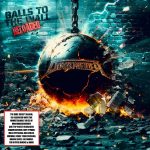
Winterfylleth: Explorations Upon The Imperious Horizon
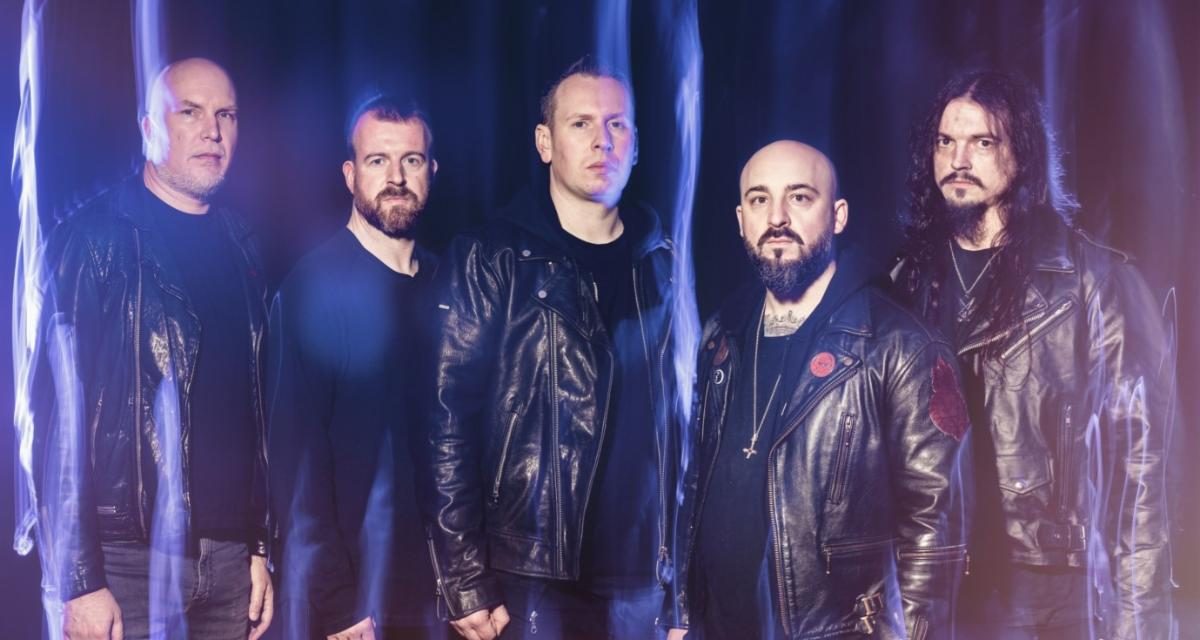
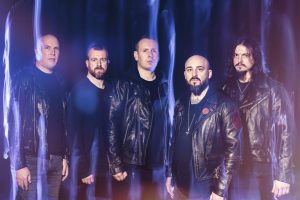
📷: Lee Barrett
Winterfylleth: Explorations Upon The Imperious Horizon
British atmospheric black metal pioneers Winterfylleth has unleashed The Imperious Horizon upon the world at large. A massive collection of intensive artistry, The Imperious Horizon is available worldwide via Candlelight/Spinefarm Records! With the unveiling of their eighth full length endeavor, Winterfylleth is sure to enrapture all types of music fanatics who venture into the realm of The Imperious Horizon. Highwire Daze recently interviewed vocalist/guitarist Chris Naughton to discuss the making of The Imperious Horizon, the Emperor cover contained within, his new custom Technavolt Green Cathedral guitar pedal, and other topics from an absolutely epic career in music. Read on…
We’re here with Chris from Winterfylleth. First of all, I want to go immediately into the new album. Is there any overall story or concept behind the album title, The Imperious Horizon?
Yeah, absolutely. With all the albums we’ve made, and this one particularly, they’re the sort of moments in time that capture the state of the world – perhaps our views in the state of the world, and I guess some measure of a social commentary in the lyrics that we try and kind of stylishly work into some of the ancient poetry and texts and stories of ancient Britain and beyond. The title, The Imperius Horizon, is an interesting one. I think it’s a reaction to what’s going on in the world at the moment over the past few years. I think in my head, it was always about some kind of looming dread or looming terror or looming agenda that’s kind of just over the horizon, that it’s kind of out of sight, but we all know it’s coming and always there. I think imperious sort of speaks to this kind of like arrogant, scheming nature in essence, and the horizon, obviously, is a kind of – I think that we all have concepts of, the sun rises from beyond the horizon. If you’re traveling or just over, that hill is where we’re going or whatever it might be. And I think the idea that there’s a lot of things that go on in the world that feel quite duplicitous and scary at the moment.
I think if you look at some of the prevailing narrative in the world, in our own country, for example, they’re talking about things like national service. And it feels like on some fronts, we’re perhaps heading towards a war maybe, or something. All these things that have happened over the last few years, that various people have been worried about their freedoms in certain contexts. And I think that the world and our world leadership feel kind of very on edge at the moment. I think that my view on it was that there’s always something coming, there’s always something kind of chipping away at people’s freedoms or chipping away at the idea of our connections with one another. And so, I guess we were kind of compelled to write songs that are roughly within that sphere of discussion.
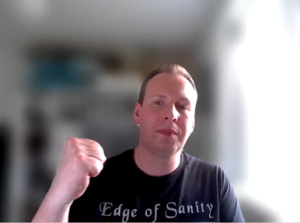
Chris Naughton of Winterfylleth via Zoom!
Let’s talk about a few of the songs. Dishonour Enthroned, tell me a little about that one. That’s such a loaded title too.
So, Dishonour Enthroned, yeah, I liked the idea of using some kind of ancient British pastoral poetry. Taking a step back, there’s this really long history of pastoral poetry, which I guess is about sort of nature in the countryside and this kind of idealized version of pastoral ideal, if you will. And there’s an interesting poem which is called The King’s Death or On the Death of the King by a guy called Alexander Brome from the 1600s. I liked the way that the poem was structured. It uses this sort of metaphor essentially, of a, I think kind of like a shepherd really, or certainly a kind of figure of gentle authority. Talking about how that person used to keep things peaceful in their land.
The third line sort of says, “Who fed, not fed upon, his sheep.” So, it’s like about, I guess, an honorable leader who treated people with the respect and love that they deserve rather than using them as, I guess, pawns in a game. You tend to see this psychopathy that lives at the top of power structures and governments that, I don’t know, thinks of humans in our armies as cannon fodder or thinks as people of being lesser or greater citizens and doesn’t think that people should have access to medical care or to basic necessities and things like that.
The idea, I suppose, is that it uses an ancient poem to be a view of how certain governments and certain individuals treat people who are kind of at the bottom of the tree. And how that’s a sort of damning reflection of our societies that we sort of look down upon the least of us in some ways and are always trying to kind of steal away people’s freedoms, people’s ability to look after themselves, to be healthy, whatever that might mean. I guess the flow of the tale, the flow of the lyric sort of speaks to that and hints at the end, when foxes now the shepherds be, it kind of speaks to how people have got themselves into those positions of power and being, I guess, people who make all these promises in their manifestos or in their campaigns. And then when it comes down to it, that’s what never happens. And so, really, they just become almost like the fox in nature, kind of devious and scheming and take things away from people and really never give anything back. So, that’s kind of the idea of that one, and I guess that’s sort of a wider theme that’s run through some of this.
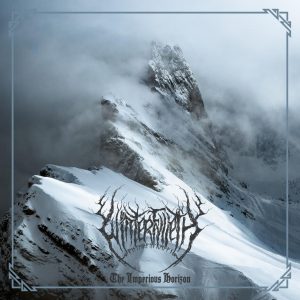
We’ve done lots of touring with Primordial and Alan’s other bands over the years. Winterfylleth has played with Primordial, certainly, 10-plus times probably, over the years. And they were one of those bands who were around before we started, and I guess to some extent, were a bit of an inspiration for us starting our own band. Really kind of interesting tales of history, interesting way they use melody and timing, and a very Irish perspective they have. I quite liked the idea of there being something beyond the Scandinavian, something beyond the Norse, perspective on black or pagan metal, maybe, as they might be.
Alan’s become our friend over the years. We’ve probably known him for, I don’t know, certainly 15 years, maybe or more, something like that. On our last album tour, actually, we took Alan’s other band, who were called Dread Sovereign, and we took them out as our support. So, we got to know Alan really well over the years. When it came time to do this record, we had a song that we hadn’t quite finished from the last album. It was sort of hanging over in the demo stages, and we never really kind of fully realized it. I think because we had quite a lot of material already finished for the last one, we decided to put it down and thought, we’re probably not giving this our best effort at the moment, so we’ll perhaps leave it to another time.
As it turns out, that was three years later when we started this album. And listening to it, particularly once we developed it a bit more from the demo stages, you just sort of start coming up with melodies in your head or in the room or in the moment. You start singing things, you start playing guitar over it. And it very much felt to us like it would suit that grandiose, quite unique style that Alan has of vocalizing and singing. We just asked him, like, “Will you come and sing on this?” Hoping that he would, he happily agreed.
He came over after we finished the album and did a version of the song with that on it, and we decided to do that on the album. There were a few different versions of that song. We recorded it all at once over a, I think, 10-day, 12-day period or something. And I’d sung a version of that song that was just kind of me doing the extreme vocal that’s obviously present on the rest of the songs. But we felt like it needed more than that. And so, we ended up doing this kind of blend of our two voices in the song, which I think was much better. It really elevated that song into a much more grandiose and poignant moment on the album that I’m really happy we managed to do. I think it’s one of the highlights of the album, in my opinion, and I hope that our collective fan base also thinks that and gets into it.
Emperor is playing again after all this time. You’re covering an Emperor song on this album, The Majesty of the Nightsky. What made you decide to cover that particular Emperor song? And has anyone in Emperor heard it?
Yes, is the short answer to that one. When you’re thinking about doing albums in the modern world, you want to do the core of the album being obviously all the original material and whatever it is, the nine songs that make up the standard version of our album, which is the whole vision of it, is kind of what most people might hear. But then I guess you want to do interesting other things, and maybe have extra material to do, like, deluxe versions or if you’re doing a single or something, you could put it on the B side of a seven-inch or whatever it might be. We wanted to do some extra tracks, and so we had, I think, four or five other songs that were recorded that we didn’t use.
Then we’ve had this habit of sort of covering songs from our favorite bands over the years. We’ve done a cover of, I Troldskog Faren Vild by Ulver. We’ve done Woden by Enslaved. We’ve done various other things over the years. When it came to this album, because we’ve incorporated keyboards a bit more into the band over the last few years, and our keyboard player, Mark, has started playing live with us where he didn’t used to, then it felt like a good idea to us to have a go at one of the classics from a band like Emperor. We’re on the same record label as Emperor. We did some shows with them earlier in the year. I don’t know, it just felt like a sort of nice tribute to some guys who, again, were a big inspiration for some of us in the band. And particularly an album like In The Nightside Eclipse, which that track is from, that has become so revered over the years that it sort of felt nice to honor it and try and do a faithful but unique version of it.
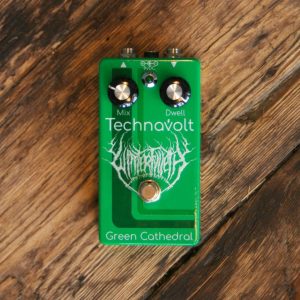
I guess it’s something that all bands probably want to do, to have their own line of gear in a sense. When we sort of started the project, it was just really to make one for myself. We rehearse just outside of Manchester in the UK, in a place called Stockport, in a really amazing old mill building that’s probably like six or seven floors, and it’s like a huge expanse of the building. And so, part of that is like the kind of rehearsal suites where we have a room. On some of the other floors, there’s all sorts of stores, antique stores, furniture stores, dance studios, shooting ranges, karate lessons, and all these kinds of things. There’s a crazy amount of stuff going on in there. But then one of the guys we discovered in there was a luthier called Jim Fleeting.
I was talking him through the story of this track we have from a few albums ago, which is called Green Cathedral. There’s quite a big backstory to that in the sense that we were doing interviews for our 2014 album, which is called The Divination of Antiquity with a guy called Ben Myers, who was writing for Metal Hammer magazine in the UK. He’s now become quite a famous writer and had seven or eight novels out, I think, by this point, and maybe one even made into a TV series on the BBC. He become fairly well known. But at the time, I don’t think he was as prolific a writer. But he was really interested in the concept of the record and the kind of link we have with nature and I guess environmentalism in some ways.
He was telling me about this concept he had called the Green Cathedral, which is this idea that if you go and stand out in nature, you climb up a mountain, you feel the wind in your face, or you go and stand at the seashore, and you feel the kind of the mist or the runoff coming off from the sea into your face and things like this – you have a really kind of spiritual connection with that. If you look out over a vast landscape, you feel the same. And so, he was almost sort of saying that this idea of the Green Cathedral is, you can find spirituality and personal sanity and personal spiritual connection to the world without the need for religion and perhaps the cathedrals of man, if you like.
And so, we kind of asked him about that. I said, “Look, we’d quite like to make a song about that.” And so when it came to the album afterwards, which is called The Dark Hereafter, we did that song on there. Ben wrote an ode, like a kind of poem or a sort of backstory for that, and we were kind of went backwards and forwards with him on it a little bit. Anyway, fast forward, I don’t know what we are now, six or seven years later, I was speaking to Jim about this. I said, “Look, I really like the lead guitar sound and the reverb on the clean parts in this track. I wonder maybe because it’s got such a great backstory, whether we try and build something around this and also make me a pedal that I want for playing live with.”
And so, they kind of took the record away and did all this amazing modeling, sound modeling, and found all the right tones and built it into this little green box, which is amazing. If you’re into gear, it’s a really high-end boutique pedal, with loads of really solid and quality components. It just matches the sort of sound we had. We launched it last Thursday. And yeah, it’s going pretty well. I’m hopeful to get this in the hands of some great musicians and see what they think of it as well.
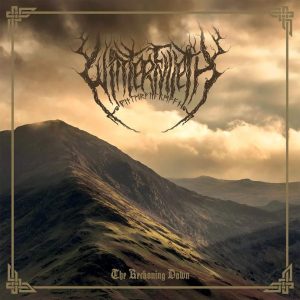
It was weird. In some ways, it was a good thing for us, I think, and in other ways, it was not so good. I suppose it was good from an interest in record sales perspective. When the album came out, I think it was released in early June, maybe, or perhaps late May. Certainly, in the UK, that’s when all the lockdowns and initial reactiveness were happening to the situation. I think, in the UK, we’re in a kind of stay-at-home lockdown situation from about the middle of March until perhaps the beginning of July. There was that three or four-month period where people were kind of stuck at home and you were only allowed out for an hour a day and all this sort of stuff.
But the thing is, because the record had been made and had already been in production for quite a long time, the stock was there, and it was ready. I know some bands were sort of talking about delaying their albums. But for us, we were just like, well, people have pre-ordered it, it’s already available, and so we put it out. I think certainly at that time in England, which is mainly a real frame of reference for it, is that most people were at home, had lots more time to listen to records or kind of buying lots of stuff from Amazon and wherever else, and found themselves with 12 or 16 weeks off of work, in some instances, on leave and things. So, I think it helped us in a sense that the album did really well. It kind of hit the UK Top 100 charts and things like that, which we never thought would happen for a black metal band from a fairly underground bit of the world.
But then as a consequence of that, because we put that out, it then meant we were sort of delayed in touring it by maybe 18 months or two years or something because all the tours we had planned to support the album launch were canceled. And there was all this weirdness with some venues and some places letting you play with masks or without masks, or you could have 50 people in the audience here, or there’s no rules here and things like that. So, it was a really weird time to be trying to play music.
So, I guess that’s the sort of the front and back of it, really, that we had a really weird experience with it, I guess, like most people did. But we didn’t want to just write another record through lockdown and COVID. It felt like there was certainly a while there where every man and his dog was just putting out some kind of COVID album that they made. And so, I think it was better for us to wait, tour that one, and then think about something else. So, it was an odd point, and it feels like it was a dream by this point. I don’t know how it was for you guys, but certainly, for us, it feels like this kind of weird distant memory of a dream that we had for a while, and now everything’s just back to normal.
Is Winterfylleth going to come back to the States to maybe do some shows in support of this new album?
We’ve never actually been to America to play in this band, so coming back is never actually having been in the first place. It’s an interesting one for us as a band, and it opens up a lot of questions about the potential for overseas bands at a certain level to tour in America. We’ve had offers in the past, but it just never really works for us. I mean, it’s kind of more of a financial thing and just the ability to do it than it is a desire for us to come over. We’d like to come and play for American fans. I know there’s lots of people who’d like to see the band who have never had the opportunity, certainly from the east and west coast. We’ve always had lots of chat from there.
The difficulty is maybe you’re aware of this being in the music journalism side of things, but the American government, to their great wisdom, have increased the cost of an artist visa for people traveling over from Europe or wherever, the UK, to play in the country. We’re a five-piece band, I think a visa for an individual, unless I’m way off base, is something like $1,200, $1,300. We’ve got like six guys we have to bring over, like a sound guy and five band members, so you’re looking at probably like $7,000 or $8,000 to do that. And then flights cost, I don’t know what an international flight to the UK to even like New York or somewhere. It’s probably $1,000 each.
You’ve got to hire a van for two weeks. You’ve got to hire equipment. You need to get hotels and all that sort of stuff. You’re probably looking at the better part of 15 to 20,000 pounds, probably, not even dollars, which probably, more like $25,000, before you’ve even played a note. And so, unless we got some amazing offer from a huge band to come and support them or a festival or something like that, and decided to pay the visas. It just becomes a numbers game, really not a desire game. We’d love to come over and play some shows to the American market, but unfortunately, it’s meant that lots of our American fans have had to come and see us in Europe or in the UK.
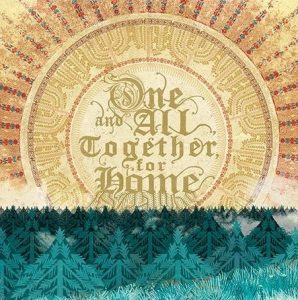
One and All, Together, for Home was a strange one, really. When we were doing our 2012 album, which is called The Threnody of Triumph, we had a few extra days left at the end of the session. And so, we decided to record a few traditional English folk songs that were kind of reasonably easy to learn in a few days. So, we recorded three tracks that were quite atmospheric and some that were based on interesting folk tales and some that are a bit more universal across a lot of the countries within the United Kingdom.
There’s one song we did, which is called The Three Ravens, but there’s like a kind of Scottish version of that that’s called Twa Corbies, and I think there might be a Welsh one that’s sort of something in the Welsh language. We sort of just tried to pick a few songs that we thought were interesting folk tales from the British Isles. So, we had those sitting around really. And then I was speaking to the guys from Season of Mist Records and then Roman from the band Drudkh from the Ukraine. And he was sort of saying, “Oh, I’m trying to put this compilation together of bands from all across Europe who have a bit of a folk influence, or in some ways might be considered folk metal or something.”
There were bands like Primordial were on there, Drudkh, Ava Inferi, Mondovolland, and all these great and interesting folk-influenced folk music bands. They asked everyone to do a few songs from their own country and their own folk culture. And so, I thought that was cool. And then we actually ended up naming it One and All, Together, for Home, which is a lyric from a Winterfylleth song called The Fields of Reckoning. I just felt this quite nice idea about people from the various different nations. Although they’re kind of either connected by borders in Europe, or I guess a similar common ancestry, that actually there’s all these quirky and unique little folk traditions that exist in the world and particularly within Europe, and how they were all kind of brought together on this compilation for people to check out. I thought it was great.
I guess that lit a little bit of a spark for us, I suppose, in some ways, but it probably wasn’t until 2018, when we did the record that’s called The Hallowing of Heirdom, and that was obviously fully acoustic, almost like acoustic black metal in a sense. It was influenced by folk music and I guess, traditional instruments, acoustic guitar, violin, cello, and things like that. But also, it had a bit of synth and voices and percussion in there as well. And that was a much more realized version of that. They were all original songs that were based on similar themes to the black metal Winterfylleth stuff.
So, yeah, we’ve always done that sort of stuff. There’s always been like interludes or the odd track here or there on our albums as a kind of a breather from the aggressive and fast-paced black metal stuff on there. It’s never gone away. We might do more of it in the future, but I guess we were just quite keen to do a much more expansive black metal record this time with the influence of a little bit more keyboards in there as well, and a few new members since the last album. So, it was not maybe the right time for us to start digging back into the acoustic guitar cases and to push things forward with a slightly new lineup.
Do you have any messages for Winterfylleth fans in the States who are reading this right now?
We spent a good amount of time making this record. We think it’s a really interesting, passionate, and atmospheric album. It very much speaks to the sort of themes of Winterfylleth, if you’re familiar with the band, but I think it builds on them, and there are definitely some kinds of new and unique elements to the album this time. I think it’s really well-paced. I hope it’s going to be a big one for us. I really can’t wait to hear what our fans in the USA think about it. We’d love to hear from you, so please, get in touch with your experiences and what you think of the album.
WINTERFYLLETH are:
C. Naughton – vocals/rhythm guitar
S. Lucas – drums/percussion
N. Wallwork – bass guitar/acoustic guitar/backing vocals
M. Deeks – keyboards/backing vocals/string arrangements
R. Dobson – lead guitar/backing vocals
(Interview by Ken Morton)
Winterfylleth on Instagram

![WILDNESS Unveil New Single & Lyric Video “Broken Heart” [Frontiers Music SRL]](https://highwiredaze.b-cdn.net/wp-content/uploads/2024/12/WILDNESS-avenger-COVER-440x264.jpg)
![GINEVRA Share New Single & Video “Let Freedom Ring” [Frontiers Music SRL]](https://highwiredaze.b-cdn.net/wp-content/uploads/2024/12/Ginevra-Photo-by-Patric-Ullaeus-440x264.jpg)

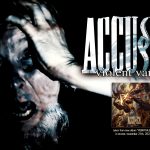
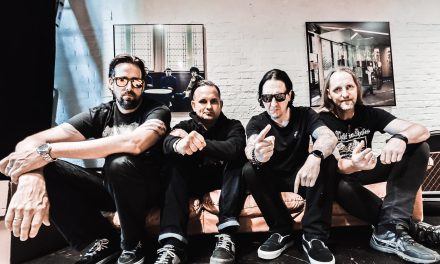
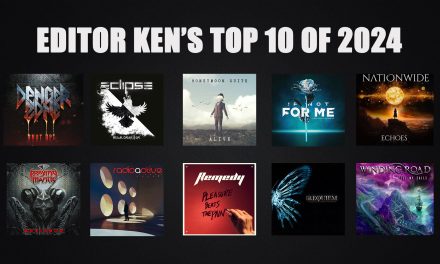
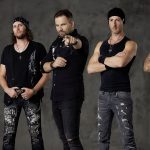

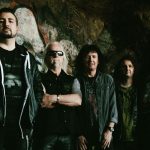

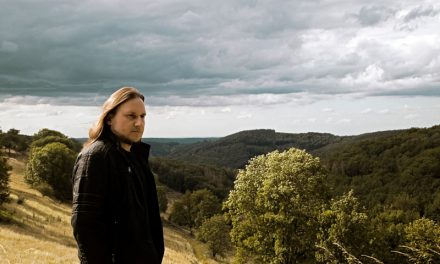
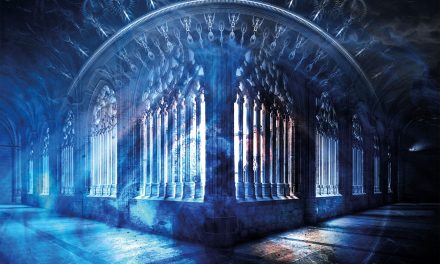




![WILDNESS Unveil New Single & Lyric Video “Broken Heart” [Frontiers Music SRL]](https://highwiredaze.b-cdn.net/wp-content/uploads/2024/12/WILDNESS-avenger-COVER-150x150.jpg)
![GINEVRA Share New Single & Video “Let Freedom Ring” [Frontiers Music SRL]](https://highwiredaze.b-cdn.net/wp-content/uploads/2024/12/Ginevra-Photo-by-Patric-Ullaeus-150x150.jpg)

